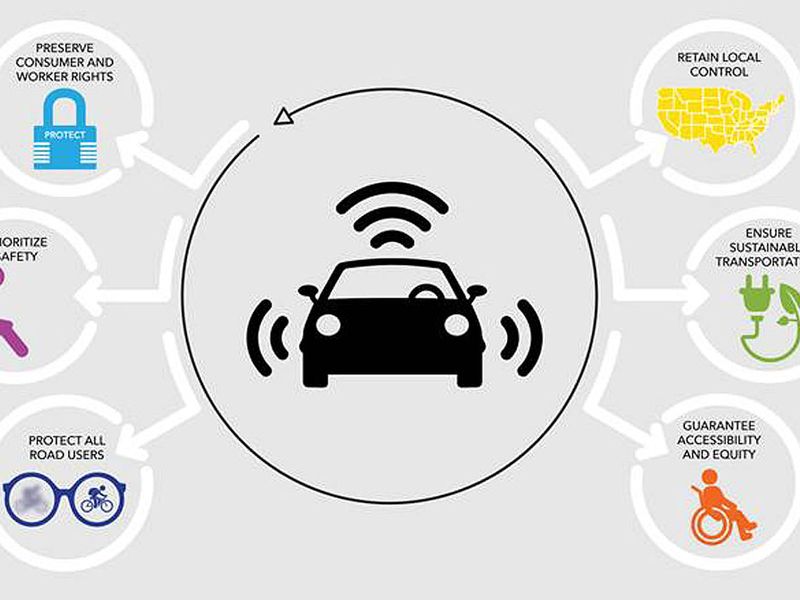
Groups advocating for consumer and vehicle safety on Monday released an outline for autonomous vehicle legislation that prioritizes safety, equity, accessibility and sustainability.
The diverse coalition includes Advocates for Highway and Auto Safety, Center for Disability Rights, Transportation for America, Consumer Reports and other stakeholders that are urging federal lawmakers to use the framework as a guide to ensure public safety.
In the outline for AV legislation, the coalition highlights a set of tenets for lawmakers to use as a “GPS,” or a way to “guarantee public safety,” according to the document.
The tenets include:
- Requiring all levels of automated vehicles to be “subject to comprehensive and strong federal standards” that address known and foreseeable safety issues.
- Making sure safety and performance data is made available to key stakeholders.
- Guaranteeing accessibility for all, especially older adults and those with disabilities.
- Preserving consumer and worker rights.
- Ensuring local control by enabling the federal government to regulate the performance of these vehicles but leaving regulation of their operation to the states.
- Directing the U.S. Department of Transportation to conduct a comprehensive study on how AVs will impact transportation systems and the environment.
The tenets also direct the Transportation Department to use its authority to issue motor vehicle safety standards for all levels of automated vehicles instead of pursuing a voluntary or hands-off approach.
Other actions by the Transportation Department and NHTSA, according to the tenets, should include issuing a federal safety standard requiring all vehicles to be equipped with technology that captures all necessary data on the performance of AVs on the road as well as requiring manufacturers to provide data on the safety and performance of test vehicles and systems, including safety-critical events such as crashes.
House lawmakers have said they’re set on prioritizing an AV bill early in the 117th Congress after earlier attempts at passing legislation stalled in the Senate.
Advocates for Highway and Auto Safety, a consortium of consumer, medical, public health and safety groups as well as insurance companies, has long insisted “commonsense safeguards” must be part of any AV legislation considered by Congress.
“Requiring that AVs meet minimum standards and that operations are subject to adequate oversight throughout development and deployment will save lives as well as costs for both the consumer and the manufacturer,” the group said in the outline for AV legislation.
“Moreover, on the path to AVs, proven solutions are currently available that can prevent or mitigate the exorbitant death and injury toll now while laying the foundation for AVs in the future.”
Action still needed
U.S. Rep. Bob Latta, who has supported renewed efforts to push AV legislation through Congress, said the ongoing coronavirus pandemic has only heightened the need for an AV bill.
“AVs can increase mobility for seniors and self-sufficiency for those with disabilities. They have limitless potential to drastically improve lives,” Latta, R-Ohio, said in an emailed statement to Automotive News.
The congressman said he will “continue to pursue opportunities to create a national framework that provides developers certainty and a clear path to deployment” in the next Congress.
Cathy Chase, president of Advocates for Highway and Auto Safety, said the Transportation Department, however, “has failed to act.”
“Instead, they have mistakenly relied on weak and ineffective voluntary industry agreements to equip vehicles with essential safety technology,” Chase said during a virtual press event on the AV tenets. “This departmental inertia has slowed progress when urgent leadership and innovation are needed.
Auto dialogue
As of Monday afternoon, no automakers or technology companies that are investing in AVs were listed as supporters of the coalition’s tenets.
“We’re hoping actually that today might kick off that dialogue,” Chase said in response to a question from Automotive News.
Still, automakers are increasing their investment in the space. General Motors said earlier this month it was upping its spending on autonomous and electric vehicles by 35 percent to $27 billion.
Tesla also is pushing forward with its AV testing and development, releasing in October a test version of what it calls a “Full Self Driving” software upgrade to an undisclosed number of “expert, careful” drivers, according to Reuters. CEO Elon Musk said there could be a wider roll out of the software in two weeks, the report said.
Chase said there is plenty of time between now and the next Congress to come to an agreement on these provisions, adding that automakers and the advocacy group have typically approached the topic from different perspectives.
“We see a great need for minimum performance standards or regulations, whereas — not to speak for them — but traditionally, they see a more hands-off or laissez-faire approach,” Chase said.
Dara Baldwin, director of national policy at the Center for Disability Rights, agreed with Chase, adding that the disability community has always had conversations with automakers regarding accessibility.
“We continue our conversations with them and trying to push them to make sure they understand that having accessible cars and doing this work includes autonomous vehicles being safe,” Baldwin said.